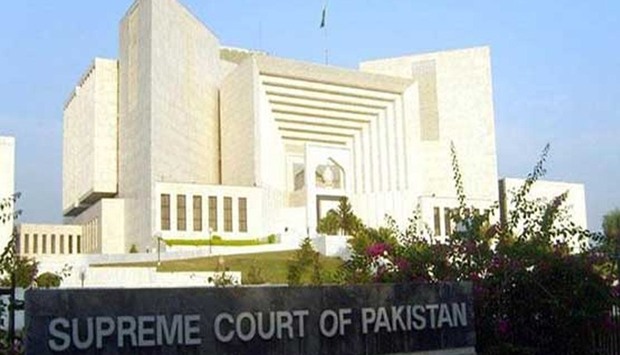The Supreme Court has wrapped up a suo motu case pertaining to the implementation of the 2011 Memogate scandal, and remarked that it is the state’s decision whether it wants to bring back former ambassador Hussain Haqqani.
A three-judge bench headed by Chief Justice of Pakistan Asif Saeed Khosa and comprising Justices Gulzar Ahmed and Ijazul Ahsan disposed of the case after none of the petitioners appeared before the court.
Former prime minister Nawaz Sharif, Qaumi Watan Party leaders and several others are petitioners in the case.
During the hearing, Chief Justice Khosa inquired: “Why have none of the petitioners appeared for the hearing? And if none of the petitioners have showed up, then why are we here?”
The additional attorney general told the court: “This case has a lot of sensitive matters.”
Observing that “an ambassador wrote a memo”, the top judge questioned: “Is today’s government feeling any threat from this memo?”
“This matter is ongoing for the last eight years,” Chief Justice Khosa added. “The court had formed a commission to probe the memo, and following the commission’s recommendations, a first information report (FIR) was registered against Hussain Haqqani.”
“Now, it is the state’s matter (prerogative) whether they want to go after the suspect and bring him back, and take whatever measures they can take,” the chief justice further said.
“How and why did the Supreme Court come in this whole matter?” he asked.
Khosa directed: “If someone has committed high treason, then the state should conduct an inquiry.”
He stated that when the matter was brought to the Supreme Court, there were allegations against the then-government and ambassador.
“Now, neither that government nor the ambassador are in power, and thus the current government should do as it deems fit. If they cannot reach the suspect, or do not want to, then they should take measures,” the top judge further said.
“Is the state, Constitution, Pakistan Army and democracy so weak that they have been shaken by a memo?” Chief Justice Khosa questioned, and added: “Pakistan is a strong nation and there is nothing to worry about.”
Following a brief hearing, the top judge remarked that the top court has nothing to do with the matter now and wrapped up the case.
The Memogate scandal erupted in 2011, when Pakistani-American businessman Mansoor Ijaz claimed to have received an “anti-army” memo from Haqqani, the then-Pakistan envoy in Washington, for then-US chairman of the joint chiefs of staff Admiral Mike Mullen.
The memo sent by Haqqani allegedly mentioned a possible army coup in Pakistan following the US raid in Abbottabad to kill Al Qaeda leader Osama bin Laden.
It also allegedly sought assistance from the US for the then-Pakistan Peoples Party (PPP) government for “reining in the military and intelligence agencies”.
In 2012, a judicial commission was tasked to probe the case, and it concluded that the memo was authentic and authored by the former envoy.
The commission said the purpose of the memo was to convince American officials that Pakistan’s civilian government was “pro-US”.
The scandal, taken to the Supreme Court by then-opposition leader Nawaz Sharif and several others, led to Haqqani’s resignation and subsequent exit from the country.
On February 1 last year the Supreme Court constituted a three-member bench to resume hearing of the controversial Memogate case, and issued a notice to Hussain Haqqani the same day.
Later that month, the apex court issued arrest warrants for the former ambassador.
In an attempt to get Haqqani to appear in the court, the Federal Investigation Agency was reported to have approached Interpol to issue red warrants for him.

Pakistan Supreme Court
